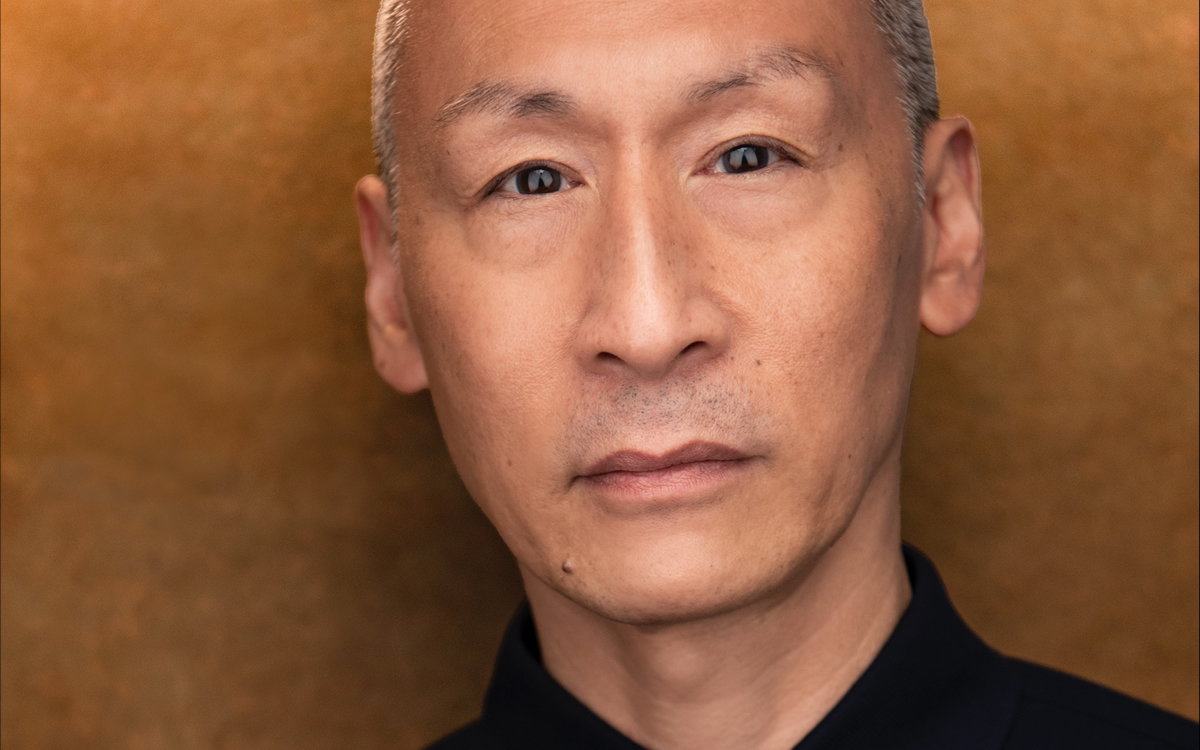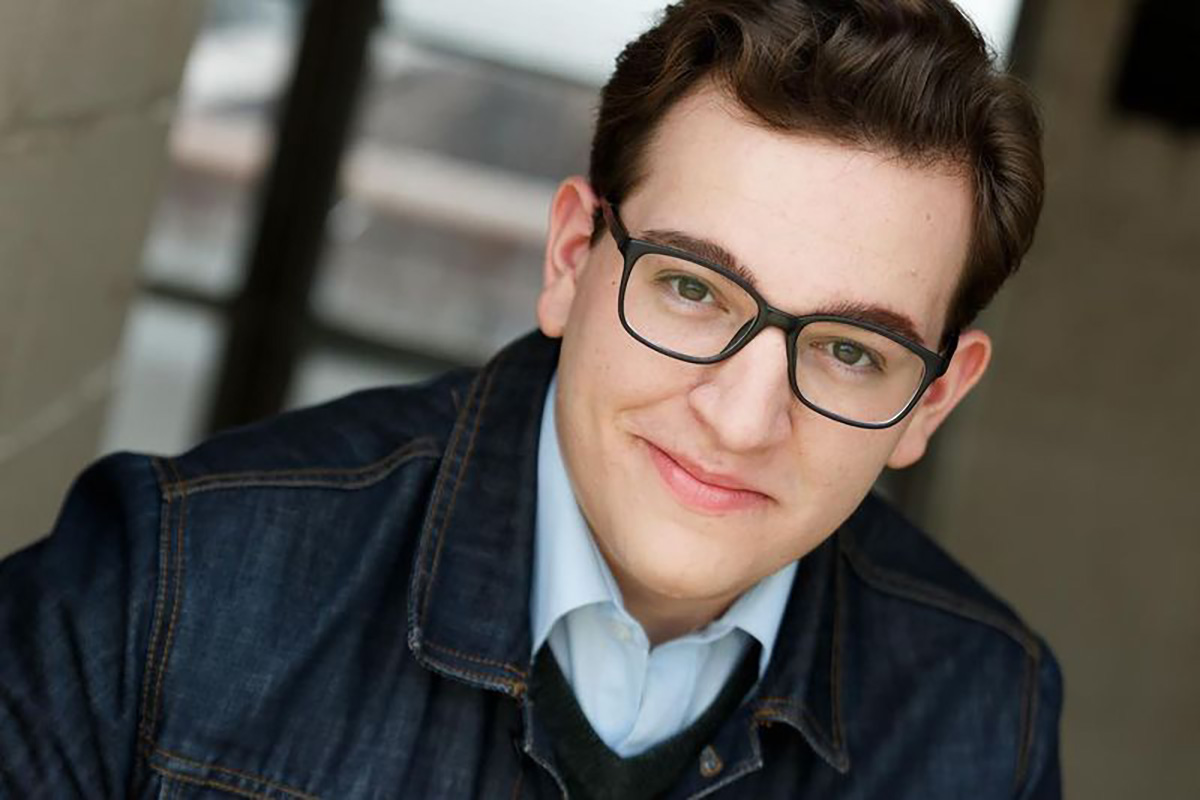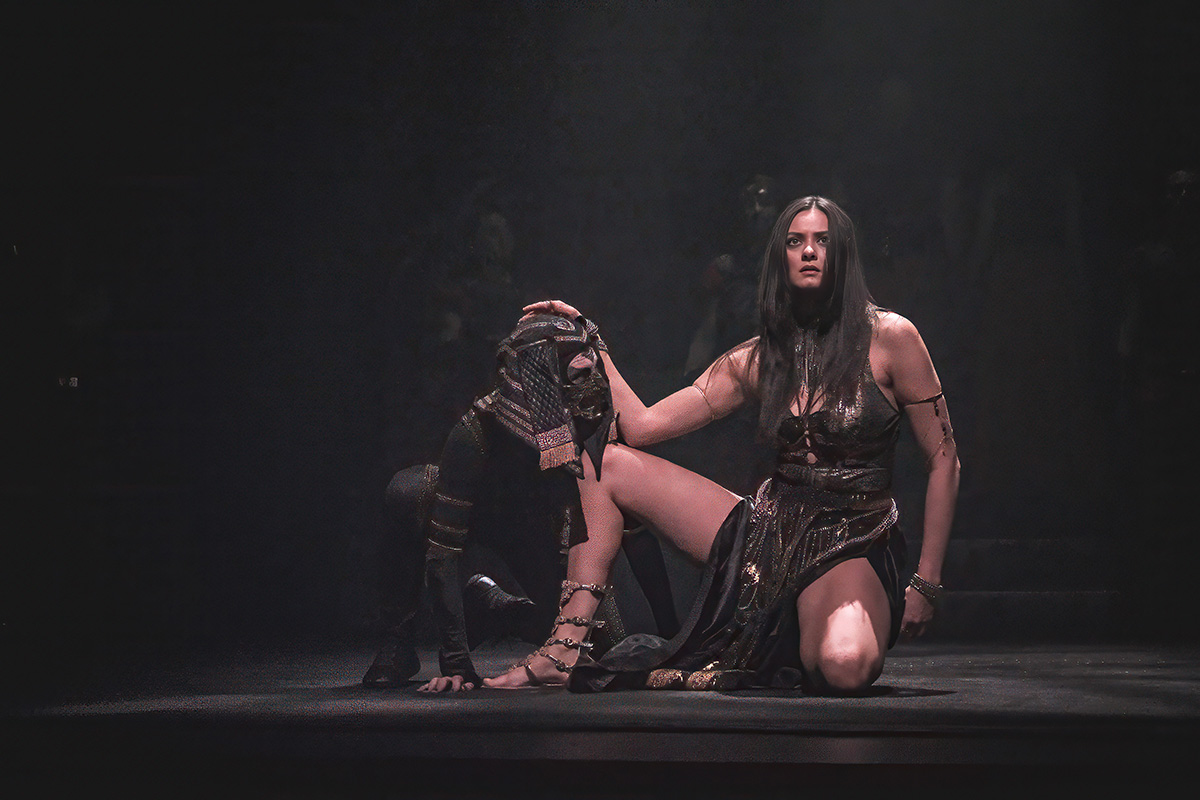Theater
‘Cambodian Rock Band’ melds horror with a rock concert
We don’t remember civilizations for their wars but for their culture

‘Cambodian Rock Band’
July 19 – August 27
Arena Stage
1101 Sixth St., S.W.
$66 – $105
Arenastage.org
When out actor Francis Jue was tapped to play the heavy in Lauren Yee’s “Cambodian Rock Band,” he made one stipulation. His character couldn’t simply be a moustache twirling villain; he had to be human.
Jue explains, “I wanted to explore how under the right circumstances, all of us might be capable of almost anything. Until you’re there, you never know.”
His instincts paid off. Jue snagged rave reviews along with the 2020 Lucille Lortel Award for Outstanding Featured Actor in a Play for his chilling work in the show’s off-Broadway run, and now that same Chay Yew-directed production is opening at Arena Stage on Wednesday.
Set in 2008, “Cambodian Rock Band” follows a father and daughter who travel to Phnom Penh — he’s returning to his homeland for the first time after 30 years and she’s prosecuting a notorious war criminal who played a role in the dictatorship of Pol Pot and the Khmer Rouge, who from 1976 to 1979 killed about 2 million people.
The playwright melds horror with a rock concert made up of music by the Los Angeles area band Dengue Fever, and sounds from the early 1970s Cambodian psychedelic pop scene that disappeared during the genocide.
“I can safely say you’ll never see anything quite like this show; it’s a roller coaster,” says Jue, a native San Franciscan turned New Yorker. He’s appeared on Broadway in “Pacific Overtures,” “Thoroughly Modern Millie” and “M. Butterfly.” His off-Broadway credits include “Good Enemy,” “Twilight: Los Angeles, 1992,” and “Wild Goose Dreams” (Obie Award). He is also known for his recurring role of Chinese Foreign Minister Ming Chen on TV’s “Madam Secretary.”
WASHINGTON BLADE: Is “Cambodian Rock Band” a world you can relate to? What’s your way in?
FRANCIS JUE: Here and now LGBTQ people are being targeted with hundreds of laws — proposed and passed; and SCOTUS says we can be discriminated against and women can’t be trusted with autonomy. I have the privilege of working in a play that allows me, in my way, to respond to that. So, yes.
BLADE: When did you know theater could be gratifying in this way?
JUE: As a kid, I couldn’t put a sentence together in front of people. Through theater I saw people talking about things that mattered to me but couldn’t express. I knew from that moment on how I was going to live my life. I wasn’t sure how I’d get there, but I was determined.
Conjuring real emotion in a safe space was a revelation, and it rescued me during my time as an English major at Yale and when I began getting hired to do it professionally.
BLADE: Is the show’s music element important?
JUE: The first victims of an authoritarian regime are usually musicians, artists, actors and filmmakers. As a rock show, there is joy in expressing ourselves. That’s why the authoritarians are afraid of us. We invite people to imagine a better future. It’s important now in a lot of ways, especially when theaters are struggling.
The temporary closure of the prestigious Mark Taper Forum in Los Angeles and other announcements have rocked our industry. What if the MET Opera in New York took a year off. It’s shocking and a wakeup call. Communities don’t just get entertained by these places. They define themselves with these institutions.
We don’t remember civilizations for what wars they’ve won; we remember them for their culture.
BLADE: You’ve worked with some of the greats including Sondheim.
JUE: Oh yes, I was terrified of him even though he was always very sweet to me. Twenty years after playing the boy in the tree in “Pacific Overtures,” I was the crusty old whore who sings “Welcome to Kanagawa” in Roundabout’s 2004/2005 revival in New York. When we finished the first reading, he said “you’re like one of those old film noir broads” and he wrote some new lyrics to amplify what I was doing.
I was going for Roz Russell but I thought, OK, I’ll take it.
BLADE: You’ve mentioned in other interviews that you like to play a “range of humanity.”
JUE: That’s true. Occasionally I talk to groups of young Asian actors graduating from drama school. It seems they only want to play leading men and women, heroes and not immigrants, servants, or people with accents. And that’s their choice.
For me, those seemingly less significant parts are important, those people are my family and they deserve to have their stories told too no matter how small. Bringing their stories to life is an important part in acknowledging their humanity.
Theater
Swing actor Thomas Netter covers five principal parts in ‘Clue’
Unique role in National Theatre production requires lots of memorization

‘Clue: On Stage’
Jan. 27-Feb. 1
The National Theatre
1321 Pennsylvania Ave., N.W.
thenationaldc.com
Out actor Thomas Netter has been touring with “Clue” since it opened in Rochester, New York, in late October, and he’s soon settling into a week-long run at D.C.’s National Theatre.
Adapted by Sandy Rustin from the same-titled 1985 campy cult film, which in turn took its inspiration from the popular board game, “Clue” brings all the murder mystery mayhem to stage.
It’s 1954, the height of the Red Scare, and a half dozen shady characters are summoned to an isolated mansion by a blackmailer named Mr. Boddy where things go awry fairly fast. A fast-moving homage to the drawing room whodunit genre with lots of wordplay, slapstick, and farce, “Clue” gives the comedic actors a lot to do and the audience much to laugh at.
When Netter tells friends that he’s touring in “Clue,” they inevitably ask “Who are you playing and when can we see you in it?” His reply isn’t straightforward.
The New York-based actor explains, “In this production, I’m a swing. I never know who’ll I play or when I’ll go on. Almost at any time I can be called on to play a different part. I cover five roles, almost all of the men in the show.”
Unlike an understudy who typically learns one principal or supporting role and performs in the ensemble nightly, a swing learns any number of parts and waits quietly offstage throughout every performance just in case.
With 80 minutes of uninterrupted quick, clipped talk “Clue” can be tough for a swing. Still, Netter, 28, adds, “I’m loving it, and I’m working with a great cast. There’s no sort of “All About Eve” dynamic going on here.”
WASHINGTON BLADE: Learning multiple tracks has got to be terrifying.
THOMAS NETTER: Well, there certainly was a learning curve for me. I’ve understudied roles in musicals but I’ve never covered five principal parts in a play, and the sheer amount of memorization was daunting.
As soon as I got the script, I started learning lines character by character. I transformed my living room into the mansion’s study and hallway, and got on my feet as much as I could and began to get the parts into my body.
BLADE: During the tour, have you been called on to perform much?
NETTER: Luckily, everyone has been healthy. But I was called on in Pittsburgh where I did Wadsworth, the butler, and the following day did the cop speaking to the character that I was playing the day before.
BLADE: Do you dread getting that call?
NETTER: Can’t say I dread it, but there is that little bit of stage fright involved. Coming in, my goal was to know the tracks. After I’d done my homework and released myself from nervous energy, I could go out and perform and have fun. After all, I love to act.
“Clue” is an opportunity for me to live in the heads of five totally different archetype characters. As an actor that part is very exciting. In this comedy, depending on the part, some nights it’s kill and other nights be killed.
BLADE: Aside from the occasional nerves, would you swing again?
NETTER: Oh yeah, I feel I’m living out the dream of the little gay boy I once was. Traveling around getting a beat on different communities. If there’s a gay bar, I’m stopping by and meeting interesting and cool people.
BLADE: Speaking of that little gay boy, what drew him to theater?
NETTER: Grandma and mom were big movie musical fans, show likes “Singing in the Rain,” “Meet Me in St. Louis.” I have memories of my grandma dancing me around the house to “Shall We Dance?” from the “King and I” She put me in tap class at age four.
BLADE: What are your career highlights to date?
NETTER: Studying the Meisner techniqueat New York’sNeighborhood Playhouse for two years was definitely a highlight. Favorite parts would include the D’Ysquith family [all eight murder victims] in “A Gentleman’s Guide to Love & Murder,” and the monstrous Miss Trunchbull in “Matilda.”
BLADE: And looking forward?
NETTER: I’d really like the chance to play Finch or Frump in Frank Loesser’s musical comedy “How to Succeed in Business Without Really Trying.”
BLADE: In the meantime, you can find Netter backstage at the National waiting to hear those exhilarating words “You’re on!”
Theater
Voiceless ‘Antony & Cleopatra’ a spectacle of operatic proportions
Synetic production pulls audience into grips of doomed lovers’ passion

‘Antony & Cleopatra’
Through Jan. 25
Synetic Theater at
Shakespeare Theatre Company’s Klein Theatre
450 7th St., N.W.
Synetictheater.org
A spectacle of operatic proportions, Synetic Theater’s “Antony & Cleopatra” is performed entirely voiceless. An adaptation of the Bard’s original (a play bursting with wordplay, metaphors, and poetic language), the celebrated company’s production doesn’t flinch before the challenge.
Staged by Paata Tsikurishvili and choreographed by Irina Tsikurishvili, this worthy remount is currently playing at Shakespeare Theatre Company’s Klein Theatre, the same venue where it premiered 10 years ago. Much is changed, including players, but the usual inimitable Synectic energy and ingenuity remain intact.
As audiences file into the Klein, they’re met with a monumental pyramid bathed in mist on a dimly lit stage. As the lights rise, the struggle kicks off: Cleopatra (Irina Kavsadze) and brother Ptolemy (Natan-Maël Gray) are each vying for the crown of Egypt. Alas, he wins and she’s banished from Alexandria along with her ethereal black-clad sidekick Mardian (Stella Bunch); but as history tells us, Cleopatra soon makes a triumphant return rolled in a carpet.
Meanwhile, in the increasingly dangerous Rome, Caesar (memorably played by Tony Amante) is assassinated by a group of senators. Here, his legendary Ides of March murder is rather elegantly achieved by silver masked politicians, leaving the epic storytelling to focus on the titular lovers.
The fabled couple is intense. As the Roman general Antony, Vato Tsikurishvili comes across as equal parts warrior, careerist, and beguiled lover. And despite a dose of earthiness, it’s clear that Kavsadze’s Cleopatra was born to be queen.
Phil Charlwood’s scenic design along with Colin K. Bills’ lighting cleverly morph the huge pyramidic structure into the throne of Egypt, the Roman Senate, and most astonishingly as a battle galley crashing across the seas with Tsikurishvili’s Antony ferociously at the helm.
There are some less subtle suggestions of location and empire building in the form of outsized cardboard puzzle pieces depicting the Mediterranean and a royal throne broken into jagged halves, and the back-and-forth of missives.
Of course, going wordless has its challenges. Kindly, Synectic provides a compact synopsis of the story. I’d recommend coming early and studying that page. With changing locations, lots of who’s who, shifting alliances, numerous war skirmishes, and lack of dialogue, it helps to get a jump on plot and characters.
Erik Teague’s terrific costume design is not only inspired but also helpful. Crimson red, silver, and white say Rome; while all things Egyptian have a more exotic look with lots of gold and diaphanous veils, etc.
When Synetic’s voicelessness works, it’s masterful. Many hands create the magic: There’s the direction, choreography, design, and the outrageously committed, sinewy built players who bring it to life through movement, some acrobatics, and the remarkable sword dancing using (actual sparking sabers) while twirling to original music composed by Konstantine Lortkipanidze.
Amid the tumultuous relationships and frequent battling (fight choreography compliments of Ben Cunis), moments of whimsy and humor aren’t unwelcome. Ptolemy has a few clownish bits as Cleopatra’s lesser sibling. And Antony’s powerful rival Octavian (ageless out actor Philip Fletcher) engages in peppy propaganda featuring a faux Cleopatra (played by Maryam Najafzada) as a less than virtuous queen enthusiastically engaged in an all-out sex romp.
When Antony and Cleopatra reach their respective ends with sword and adder, it comes almost as a relief. They’ve been through so much. And from start to finish, without uttering a word, Kavsadze and Tsikurishvili share a chemistry that pulls the audience into the grips of the doomed lovers’ palpable passion.
Theater
Ford’s ‘First Look’ festival showcases three new productions
A chance to enjoy historical dramas for free before they’re completed

The Ford’s Theatre Legacy Commissions: A First Look – 2026
Jan. 16 & 17
Ford’s Theatre
511 Tenth St., N.W.
FREE
Fords.org
When Ford’s Theatre debuted its new plays festival, “A First Look,” in 2023, it was unclear whether people would come for the staged readings.
“Before the pandemic if you announced the reading of a play, 12 people might show up,” says José Carrasquillo, director of artistic programming at Ford’s Theatre. “Since then, we’ve experienced comparatively massive turnout. Maybe because it’s cheap, or because of the very newness of the works.”
This year’s fourth edition showcases readings of three pieces currently in varied stages of development. The free, two-day festival offers audiences a chance to encounter historical dramas long before they’re completed and fully produced. None are finished, nor have they been read publicly. And befitting the venue’s provenance, the works are steeped in history.
The festival kicks off with “Springs” by playwright Jeanne Sakata and directed by Jessica Kubzansky. Commissioned by The Ford’s Theatre Legacy Commissions, it’s the both epic and personal story of Sakata’s Japanese American family including her grandfather’s experience in an internment camp.
“Sakata’s immigrant grandfather was an exceptionally skilled farmer who helped to stave off starvation in the camp. Still, he never gave up on the idea that he belonged in America. It’s very much a story of today,” says Carrasquillo.
Unlike “Springs,” the festival’s two other works weren’t commissioned by Ford’s. But they both fit the history brief and likely will benefit from the exposure and workshopping.
“Providence Spring,” by California based playwright Richard Helesen and directed by Holly Twyford, portrays Clara Barton (played by local favorite Erin Weaver) as a hero beyond the Red Cross whose then-radical initiatives included cataloguing the Civil War dead, many pulled from mass graves.
Directed by Reginald L. Douglas, “Young John Lewis: Prodigy of Protest” explores a slice from the life of the legendary civil rights activist and longtime congressman. With book and lyrics by Psalmayene 24 and music by Kokayi this collaboratively staged reading between Ford’s and Mosaic Theater is slated to premiere fully produced at Mosaic as a 90-minute musical in the spring of 2026.
“When I was hired at Ford’s in 2018, we began discussing hiring writers who do historical drama,” says Carrasquillo. “Our intention was resolute, but we didn’t do it right away. It took getting through the pandemic to revisit the idea.”
At the same time, the racial reckoning spurred Ford’s to hire playwrights of color to tell stories that had previously been forgotten or ignored.
For Carrasquillo, who is gay, the impulse to commission was crystalized when he saw the film “Hidden Figures,” a true story about “three brilliant African-American women — at NASA during the Space Race, overcoming racial and gender discrimination to make crucial contributions to America’s spaceflight success.” He says, “the film floored me. How many stories like this are there that we don’t know about?”
One of the festival’s happiest experiences, he adds, was the commission of playwright Chess Jakobs’s “The American Five” and its subsequent success. It’s the story of Martin Luther King Jr. and his inner circle, including Bayard Rustin (MLK’s brilliant, unsung gay adviser) leading up to the 1963 March on Washington. The play later premiered fully produced in Ford’s 2025 season.
Increasingly, the readings at Ford’s have become popular with both artists and audiences.
At Ford’s, Carrasquillo wears many hats. In addition to selecting plays and organizing workshops, he serves as an in-house dramaturg for some of the nascent works. But he’s not alone. Also helming the festival are senior artistic advisor Sheldon Epps, and The Ford’s Theatre Legacy Commissions advisor Sydné Mahone.
Because the plays are in development, comments from directors, dramaturgs, and the audience are considered and may become part of the playwrights’ rewrites and changes. If and when the play resurfaces fully produced, audience members might find their suggestion in the completed work.
Is this year’s festival queer influenced? Yes, both by those involved and the topics explored.
Carrasquillo explains, “While Sakata’s “Springs” is primarily about immigration, its message is relevant to the queer community. Civil rights are being taken away from us. We need this playwright’s story to know what has happened and what can happen to any of us.
“Many of Ford’s legacy commissions underscore the importance of civil rights in our country and that’s important to all of us. Queer and not queer.”




















